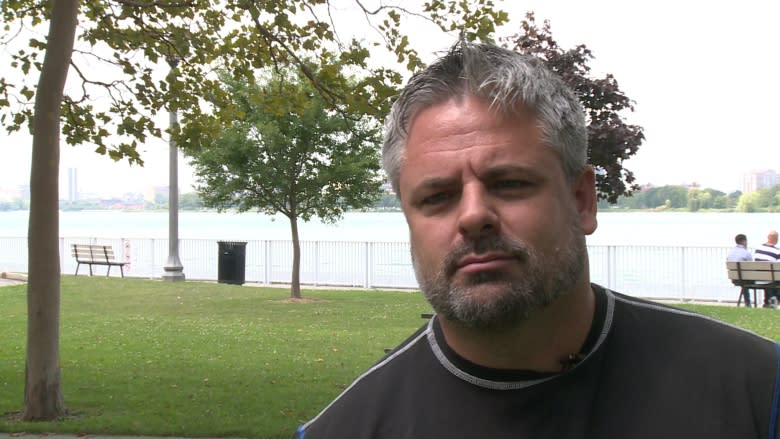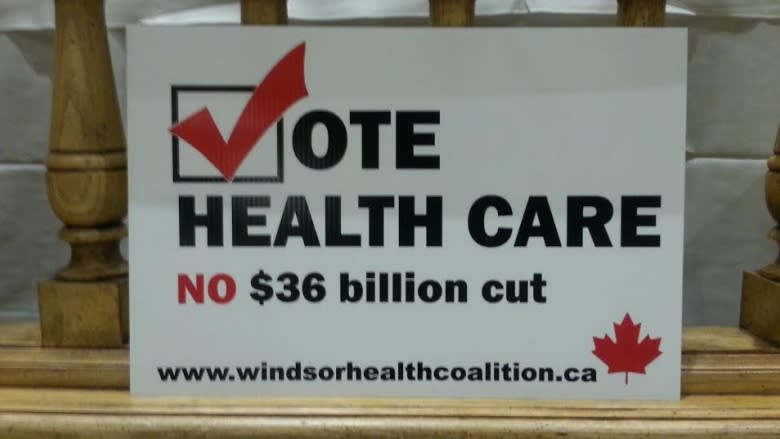Lawn signs first, registration second for health care advocacy group
An advocacy group handed out hundreds of signs at a politically charged health-care rally held in the Windsor area this week, even though it hadn't yet registered as a third party with Elections Canada.
The Windsor Essex Health Coalition was among a handful of groups that participated in an event that was held at the Ciociaro Club on the outskirts of the city this past Wednesday.
More than 1,000 people were present at the event, which also involved Unifor, the Ontario Health Coalition, the Canadian Doctors for Medicare and the Windsor-based Pathway to Potential. Many of those in attendance were retired auto workers and union members.
The groups were talking about health care and what they believe is at stake in this election, though speakers expressed opposition to the way health transfers are slated to change if the Conservatives form the next government.
Unifor National President Jerry Dias told the crowd that the health-care system and its preservation was "the number one issue to be dealt with" this fall.
While the event was supposed to be non-partisan, Dias made several direct appeals on behalf of local New Democratic candidates. The labour leader told CBC News that "it's hard to talk about health care without talking about politics."
Ken Lewenza, the former president of the Canadian Auto Workers, which is now a part of Unifor, also addressed the crowd.
He said that politicians of all stripes were invited to the event, though no Conservative candidates appeared to be present.
Jeff Watson, a Conservative candidate and the incumbent in the riding of Essex, told CBC News in a telephone interview that he did not receive an invite to the event.
Watson also questioned if all the groups involved in the event, which he described as being "broadly aligned with the left," had registered as third parties. He noted that Unifor was registered.
'We're meeting the requirements'
A number of lawn signs, which urge the public to "vote health care" and to reject a "$36 billion cut" were distributed at the event. The signs had a web address printed on them that belongs to the Windsor Essex Health Coalition.
That group's chair, Ken Lewenza Jr., confirmed to CBC News that the Windsor Essex Health Coalition was not registered as a third party when the rally occurred. But he said it did register with Elections Canada on Friday.
"We registered today, but that's not the issue," he told CBC News in an interview.
"That's not the issue at all. The reality is, we're meeting the requirements of the law."
Third parties, which could include business associations, unions or other types of interest groups, are supposed to register with Elections Canada if they incur or will incur election advertising expenses of $500 or more.
Elections Canada defines advertising for these cases as "the transmission to the public by any means during an election period of an advertising message that promotes or opposes a registered party or the election of a candidate, including one that takes a position on an issue with which a registered party or candidate is associated."
Lewenza Jr., the son of the former union leader, said the Windsor Essex Health Coalition "probably had about 700 to 800 signs at the protest." He said the group would likely have more placed in the community in the weeks ahead.
He said the real issue for the public to consider is the future of health care.
"We need to just get back to talking about health-care issues," said Lewenza Jr.
It's unclear if any complaints were filed in relation to the signs, as a spokesperson for the Commissioner of Canada Elections said it does not confirm the existence of complaints that have been filed.
Lydia Miljan, an associate professor of political science at the University of Windsor, said that a bunch of lawn signs won't put any group near an eventual spending limit.
"It's really when they go and start paying for TV time, radio spots, newspaper spots that they get into some serious money and that's where their budgets can be eaten up quite, quite heavily," she told CBC News in an interview.



